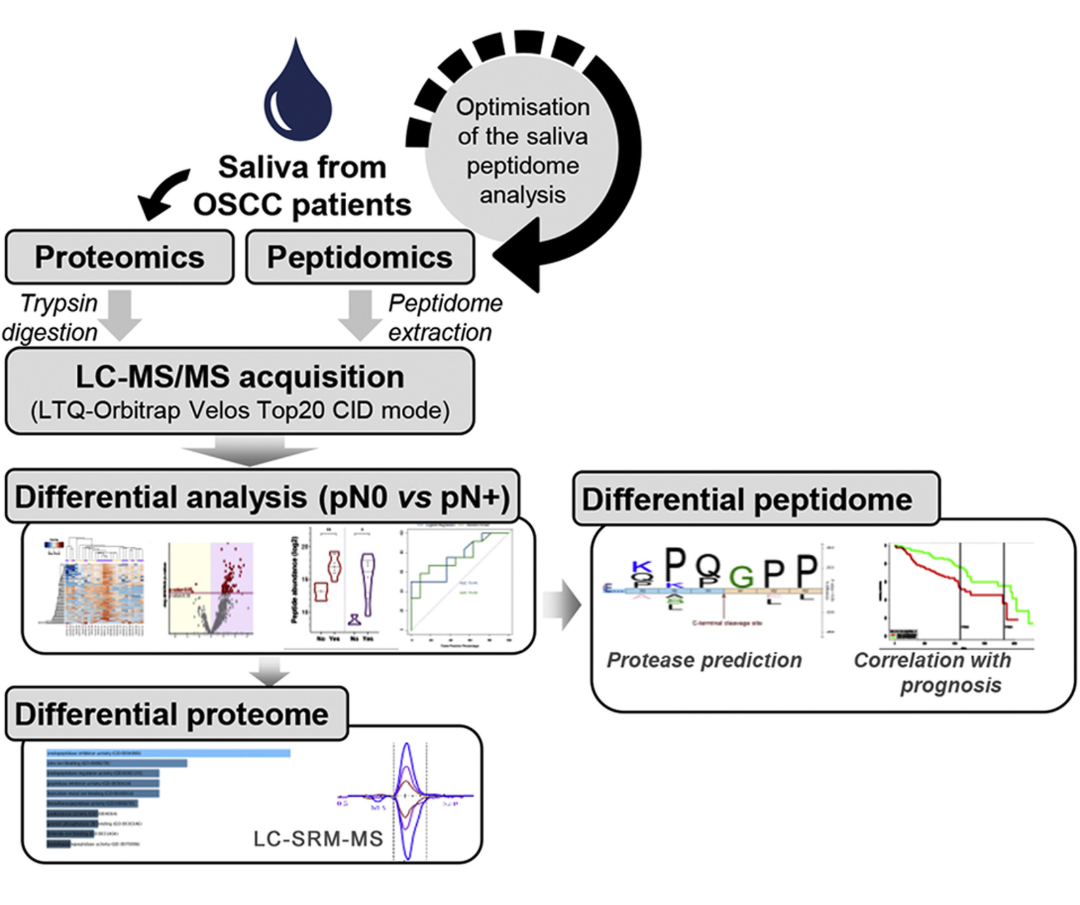Pharmacopeptidomics Research Service
- Tissues (e.g., liver, brain, kidney)
- Cultured cells (adherent or suspension)
- Biofluids (e.g., plasma, serum, cerebrospinal fluid)
- Tissues: ≥ 200 mg
- Biofluids: ≥ 200 µL
- Cells: ≥ 1 × 10⁷ cells per sample
- Samples should be stored at -80℃ and shipped with dry ice.
Pharmacopeptidomics is an emerging discipline at the intersection of pharmacology and peptide science, focusing on the systematic investigation of peptides in the context of drug action and therapeutic modulation. By integrating advanced mass spectrometry-based peptidomics with pharmacodynamic and pharmacokinetic analyses, this approach enables researchers to capture the dynamic peptide landscape that reflects protease activity, post-translational modifications, and signaling responses induced by pharmaceutical compounds. Unlike traditional proteomics, which primarily investigates intact proteins, pharmacopeptidomics emphasizes low-molecular-weight peptides that are directly involved in cellular communication, metabolic regulation, immune responses, and enzymatic pathways. Through the identification and quantification of these bioactive peptides, researchers gain mechanistic insights into how drugs influence biological systems at a functional level, including on-target efficacy, off-target effects, and compensatory molecular responses.

Figure 1. Peptidomics-Driven Strategy Reveals Peptides and Predicted Proteases Associated With Oral Cancer Prognosis
As a high-resolution tool for elucidating drug–peptide interactions, target validation, and biomarker discovery, pharmacopeptidomics is increasingly valuable in both preclinical and translational research. MtoZ Biolabs offers comprehensive Pharmacopeptidomics Research Services to support pharmaceutical development by mapping peptide alterations in response to drug exposure, thereby facilitating more informed decision-making in drug discovery and optimization.
Service at MtoZ Biolabs
By combining deep technical expertise with advanced LC-MS/MS platforms and tailored analytics, MtoZ Biolabs delivers high-quality, insight-rich pharmacopeptidomics solutions. We offer the following core capabilities:
💠Comprehensive Peptidome Profiling under Drug Treatment
We perform large-scale profiling of peptides in drug-treated versus control samples to assess how pharmaceuticals influence the peptidome. This analysis captures drug-responsive peptides linked to protease activation, signaling alterations, or tissue-specific responses.
💠Quantitative Peptide Analysis for Pharmacodynamic Assessment
Using label-free or isotope-labeled quantitative strategies, we provide time-resolved and dose-dependent data to track peptide-level changes in response to drug exposure. This supports detailed pharmacodynamic (PD) modeling and mechanistic interpretation.
💠Peptide Biomarker Discovery and Validation
Our team identifies peptides that serve as candidate biomarkers for drug efficacy, toxicity, or therapeutic response. These biomarkers can be used in early-phase drug screening or as surrogate endpoints in clinical research.
💠Analysis of Drug-Associated Protease Activity
We analyze proteolytic processing events affected by drug treatment to identify drug-modulated proteases and their substrates. This is particularly useful in the development of protease inhibitors or degraders such as PROTACs.
💠Peptide–Drug Interaction Mapping
For peptide-based therapeutics or drugs targeting peptide-regulated pathways, we assess how drug exposure alters the abundance, sequence, or modification state of relevant peptides. This aids in confirming mechanism of action and target engagement.
Analysis Workflow
1. Sample Preparation
Tissues, biofluids, or cell culture supernatants are processed to extract peptides using protein precipitation and ultrafiltration methods optimized for low-molecular-weight fractions.
2. Peptide Enrichment
Solid-phase extraction or magnetic bead techniques are used to concentrate and purify native peptides, removing interfering substances while preserving biologically active species.
3. LC-MS/MS Analysis
High-resolution LC-MS/MS is performed on Orbitrap platforms using DDA or DIA modes, enabling sensitive detection of drug-responsive peptide species across experimental conditions.
4. Peptide Identification and Quantification
Peptides are identified through database search and optionally de novo sequencing, followed by relative or absolute quantification to assess pharmacodynamic effects.
5. Bioinformatics Interpretation
Differential peptides are annotated for their precursor proteins, cleavage events, and potential involvement in drug response pathways, supporting mechanism-of-action studies and biomarker discovery.
Why Choose MtoZ Biolabs?
☑️Advanced Analysis Platform: MtoZ Biolabs established an advanced Pharmacopeptidomics Research Service platform, guaranteeing reliable, fast, and highly accurate analysis service.
☑️Peptidomics-Focused Expertise: With a dedicated team experienced in peptide science and drug mechanism studies, we specialize in extracting actionable insights from complex peptidome data.
☑️Tailored Study Design: We offer fully customized workflows to fit diverse research goals, including time-course studies, dose-response experiments, or tissue-specific profiling.
☑️One-Time-Charge: Our pricing is transparent, no hidden fees or additional costs.
Sample Submission Suggestions
1. Sample Types
We accept various sample types, including but not limited to:
2. Sample Quantity
3. Storage and Transport
*Note: If you have special sample types or require additional guidance, please contact us for personalized support before shipping.
Deliverables
1. Comprehensive Experimental Details
2. Materials, Instruments, and Methods
3. Total Ion Chromatogram & Quality Control Assessment
4. Data Analysis, Preprocessing, and Estimation
5. Bioinformatics Analysis
6. Raw Data Files
Related Services
Peptidomics-Based Drug Target Research Service
Peptidomics-Based Drug Side Effects Research Service
How to order?







